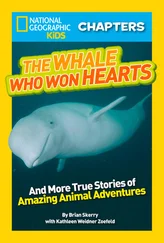The news was quickly communicated to the town, and the local radio and television stations sent reporters out to Wainui. One enterprising cameraman hired a local helicopter to fly him over the scene. It is his flickering film images that most of us remember. In the early morning light, along three kilometres of coastland, are two hundred whales, male, female, young, waiting to die. The waves break over them and hiss around their passive frames. Dotted on the beach are human shapes, drawn to the tragedy. The pilot of the helicopter says on camera, ‘I’ve been to Vietnam, y’know, and I’ve done deer culling down south.’ His lips are trembling and his eyes are moist with tears. ‘But my oath, this is like seeing the end of the world.’
One particular sequence of the news film will remain indelibly imprinted on our minds. The camera zooms in on one of the whales, lifted high onto the beach by the waves. A truck has been driven down beside the whale. The whale is on its side, and blood is streaming from its mouth. The whale is still alive.
Five men are working on the whale. They are splattered with blood. As the helicopter hovers above them, one of the men stops his work and smiles directly into the camera. The look is triumphant. He lifts his arms in a victory sign and the camera sees that he has a chainsaw in his hand. Then the camera focuses on the other men, where they stand in the surging water. The chainsaw has just completed cutting through the whale’s lower jaw. The men are laughing as they wrench the jaw from the butchered whale. There is a huge spout of blood as the jaw suddenly snaps free. The blood drenches the men in a dark gouting stream. Blood, laughing, pain, victory, blood.
It was that sequence of human butchery, more than any other, which triggered feelings of sorrow and anger among the people on the Coast. Some would have argued that in Maori terms a stranded whale was traditionally a gift from the Gods and that the actions could therefore be condoned. But others felt more primal feelings of love for the beasts which had once been our companions from the Kingdom of the Lord Tangaroa. Nor was this just a question of one whale among many; this was a matter of two hundred members of a vanishing species.
At the time Kahu had just turned eight and Koro Apirana was down in the South Island with Porourangi. I rang them up to tell them what was happening. Koro said, ‘Yes, we know. Porourangi has rung the airport to see if we can get on the plane. But the weather’s cracked down on us and we can’t get out. You’ll have to go to Wainui. This is a sign to us. I don’t like it. I don’t like it at all.’
Luckily, knowing Kahu’s kinship with the sea, I was glad that she had still been asleep when the news was broadcast. I said to Nanny Flowers, ‘You better keep our Kahu at home today. Don’t let her know what has happened.’ Nanny’s eyes glistened. She nodded her head.
I got on my motorbike and went round rousing the boys. I hadn’t realised it before, but when you catch people unawares you sure find out a lot about them. For instance, one of the boys slept on his stomach with his thumb in his mouth. Billy had his hair in curlers and he still had a smoke dangling from his lips. And a third slept with all his clothes on and the motorbike was in the bed with him.
‘Come on, boys,’ I said. ‘We’ve got work to do.’ We assembled at the crossroads, gunned our bikes, and then took off. Instead of going the long way by road we cut across country and beach, flying like spears to help save the whales. The wind whistled among us as we sped over the landscape. Billy led the way and we followed — he was sure tricky, all right, knowing the shortcuts. No wonder the cops could never catch him. We flew over fences, jounced around paddocks, leapt streams and skirted the incoming tide. We were all whooping and hollering with the excitement of the ride when Billy took us up to a high point overlooking Wainui.
‘There they are,’ he said.
Gulls were wheeling above the beach. For as far as the eye could see whales were threshing in the curve of sand. The breakers were already red with blood. We sped down on our rescue mission.
The gulls cried, outraged, as we varoomed through their gathering numbers. The first sight to greet our eyes was this old European lady who had sat down on a whale that some men were pulling onto the beach with a tractor. They had put a rope round the whale’s rear flukes and were getting angrier and angrier with the woman, manhandling her away. But she would just return and sit on the whale again, her eyes glistening. We came to the rescue and that was the first punch-up of the day.
‘Thank you, gentlemen,’ the lady said. ‘The whale is already dead of course, but how can men be so venal?’
By that time many of the locals were out on the beach. Some of them still had their pyjamas on. There were a lot of elderly people living near Wainui and it was amazing to see them trying to stop younger men from pillaging the whales. When one of the old women saw us, she set her mouth grimly and raised a pink slipper in a threatening way.
‘Hey lady,’ Billy said. ‘We’re the goodies.’
She gaped disbelievingly. Then she said, ‘Well, if you’re the goodies, you’d better go after them baddies.’ She pointed down to where a truck was parked beside a dying whale. There were several beefy guys loading a dismembered jaw onto the back. As we approached we saw an old man scuffling with them. One of the young men smacked him in the mouth and the old man went down. His wife gave a high piping scream.
We roared up to the truck.
‘Hey, man ,’ I hissed. ‘That whale belongs to Tangaroa.’ I pointed to the dying beast. The stench of guts and blood was nauseous. Seagulls dived into the bloodied surf.
‘Who’s stopping us?’
‘We are,’ Billy said. He grabbed the chainsaw, started it up and, next minute, had sawn the front tyres of the truck. That started the second punch-up of the day.
It was at this stage that the police and rangers arrived. I guess they must have had trouble figuring out who were the goodies and who were the baddies because they started to manhandle us as well. Then the old lady with the pink slipper arrived. She waved it in front of the ranger and said, ‘Not them , you stupid fool. They’re on our side.’
The ranger laughed. He looked us over quickly. ‘In that case, lady, I guess we’ll have to work together. Okay, fellas?’
I looked at the boys. We had a strange relationship with the cops. But this time we nodded agreement.
‘Okay,’ the ranger said. ‘The name’s Derek. Let’s get this beach cleared and cordoned off. We’ve got some Navy men coming in soon from Auckland.’ He yelled, ‘Anybody here got wetsuits? If so, get into them. We’ll need all the help we can get.’
The boys and I cleared the beach. We mounted a bike patrol back and forth along the sand, keeping the spectators back from the water. The locals helped us. I saw a shape I thought I knew tottering down to the sea. The woman must have borrowed her son’s wetsuit, but I would have recognised those pink slippers anywhere.
All of us who were there that day and night will be forever bonded by our experience with the stranded whales. They were tightly bunched and they were crying like babies. Derek had assigned people in groups, eight people to look after each whale. ‘Try to keep them cool,’ he said. ‘Pour water over them, otherwise they’ll dehydrate. The sun’s going to get stronger. Keep pouring that water, but try to keep their blowholes clear — otherwise they’ll suffocate to death. Above all, try to stop them from lying on their sides.’
It was difficult and heavy work, and I marvelled at the strength that some of the elderly folk brought to the task. One of the old men was talking to his whale and said in response to his neighbour, ‘Well, you talk to your plants!’ At that point the whale lifted its head and, staring at the two men, gave what appeared to be a giggle. ‘Why, the whale understands,’ the old man said. So the word went down the line of helpers.
Читать дальше












